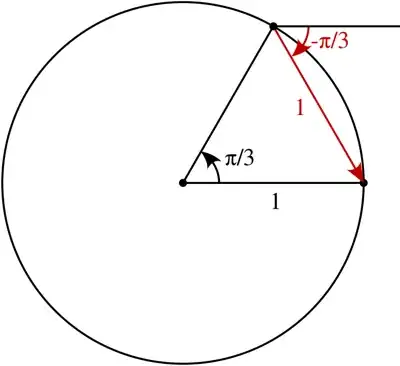Please help me find the summation of following series under limit.
$$ \lim_{n \to \infty} \sum_{x = 1}^{n}{1 \over x}\,\cos\left(\left[x - 1\right]{\pi \over 3}\right) $$
Thank you. :)
Please help me find the summation of following series under limit.
$$ \lim_{n \to \infty} \sum_{x = 1}^{n}{1 \over x}\,\cos\left(\left[x - 1\right]{\pi \over 3}\right) $$
Thank you. :)
Hint: The $\cos$ terms form a pattern for each six terms: $1, 1/2, -1/2, -1, -1/2, 1/2,$ and back to $1$. That would at least let you split the series up into ones that are more manageable.
Your sum is the real part of $$ e^{-i\pi/3}\sum_{k=1}^\infty\frac1ke^{ik\pi/3} $$ which is the series for $$ \begin{align} -e^{-i\pi/3}\log\left(1-e^{i\pi/3}\right) &=-\left(\frac12-i\frac{\sqrt3}{2}\right)\left(-i\frac\pi3\right)\\ &=\frac\pi6\left(\sqrt3+i\right) \end{align} $$
Note on the log
Since $e^{i\pi/3}$ is on the unit circle at angle $\pi/3$, we have this diagram
$\hspace{3.8cm}$
Thus, $\left|1-e^{i\pi/3}\right|=1$ and $\arg\left(1-e^{i\pi/3}\right)=-\pi/3$. Therefore, $$ \log\left(1-e^{i\pi/3}\right)=0-i\frac\pi3 $$